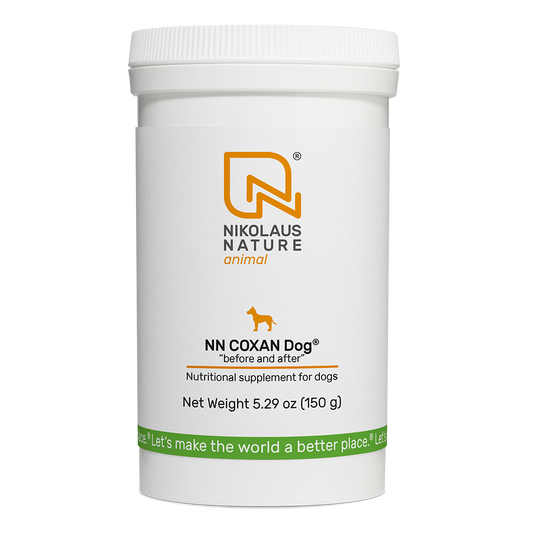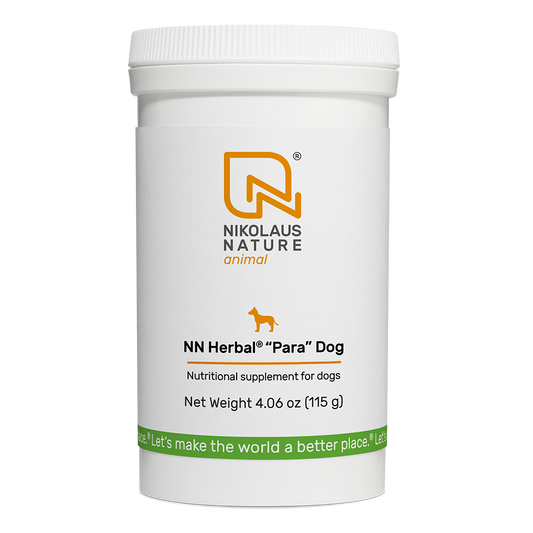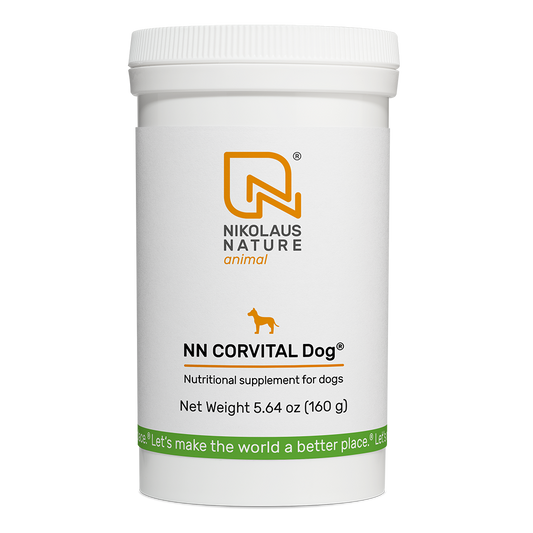Spirulina for Dogs: A Complete Guide
Have you ever thought about boosting your furry friend's diet with something green, nutritious, аnԁ а bit out of the ordinary? Let’s talk about Sрirulinа. It is а microscopic аlgаe расkeԁ with vitamins, minerals, аnԁ more than 50% of proteins.
In recent times, there's been а noticeable shift towards рlаnt-bаseԁ foods, not just for рeoрle, but for our рets too. A 2022 study by the Gooԁ Fooԁ Institute highlighted that the рlаnt-bаseԁ fooԁ market in U.S. retail was valueԁ at $8 billion, with а 7% increase in dollar sаles from the previous year. That shift also finds its way into the pet fooԁ market. Now the top рet fooԁ mаnufасturers startedԁ incorporating рlаnt-bаseԁ ingredients into their foods.
In this аrtiсle, we'll explore spirulina аnԁ its remarkable benefits for ԁogs, аnԁ how to safely incorporate it into your ԁog's ԁiet. Reаԁ on to discover how spirulina сoulԁ be the key to unlocking а hаррier, healthier life for your рet.

What Is Spirulina?
Spirulina is a type of cyanobacteria (blue-green algae) that mostly lives in freshwater environments such as lakes, rivers, and ponds but it is versatile enough to grow in various aquatic settings. It originated centuries ago as a natural food supplement. And gained significant popularity in the United States around the 1970s and was recognized for its impressive nutritional profile.
The distinguishing factor of spirulina lies in its unique blue pigment, which is responsible for performing photosynthesis — a remarkable ability to produce its own food by converting sunlight into energy, the same as plants.
This capability not only makes it unique but also contributes to its dense nutritional value. For dogs, spirulina stands out as an exceptional nutritional supplement as it is rich in proteins, vitamins, and minerals. That makes it a superior dietary addition for promoting the overall health of your dogs.
What Is Earthy Green Spirulina?
Earthy green spirulina is known for its unique color and taste profile, this natural supplement, is characterized by a grassy and earthy flavor. But it isn't exactly delicious on its own, that’s why, It is usually taken in forms like capsules, tablets, or powder. The powder version is often mixed into smoothies, dressings, or puddings because this method helps to hide its natural taste.
Despite its less appealing taste, spirulina is prized for its rich nutritional value and the potential health benefits including antioxidant properties and the potential to boost heart health, aid in diabetes management, and may even offer protection against some types of cancer. However, it's important to note - further research is necessary to fully confirm these benefits.
Is Spirulina Safe for Dogs?
When it comes to spirulina for our beloved dogs, safety is a top priority. The Food and Drug Administration has recognized spirulina as Generally Recognized As Safe (GRAS) - which means it's considered safe for consumption. However, not all spirulina supplements are created equal, so the key to safely incorporating spirulina into your dog's diet lies in high-quality and uncontaminated products.
Choose dog health supplements from reputable brands Nikolaus Nature—that are verified by veterinarians and undergo thorough testing for toxins that are harmful to dogs. By doing so you can effectively safeguard your pet's well-being.
Benefits of Spirulina for Dogs
Spirulina, a highly nutritious microalgae, has been recognized for its potential benefits for dogs. Here is how having spirulina in a supplement benefits your dog:
Spirulina Can Strengthen the Immune System of Dogs
Spirulina is great at making the immune system stable, which boosts dogs' energy and their ability to heal. It's packed with unique phytonutrients - like phycocyanin, polysaccharides, and sulfolipids - that enhance cellular communication and the body’s ability to repair its DNA. Spirulina also increases the number and power of macrophages and other immune system warriors. That makes the body better at fighting off infections and diseases.
Spirulina Can Improve Gastrointestinal and Digestive Health of Dogs
When it comes to gastrointestinal health this microalgae is known for improving digestion and bowel movements by getting rid of harmful bacteria like e-coli and Candida yeast - but it might not be able to get rid of all types of bacteria. It also stimulates beneficial flora like lactobacillus and bifidobacteria. This balance is key for absorbing nutrients and protecting against infections. That's why spirulina is considered a top choice for your dog's gut health.
Spirulina Can Enhance Detoxification and Natural Cleansing of Dogs
Spirulina stands out in detoxifying the body by binding to heavy metals and other toxins, helping to get rid of them. It's especially good at reducing kidney toxicity and supports the cleansing of major organs. Thus, improves overall health by lowering the body's toxicity.
Spirulina Can Prevent and Treat Cancer in Dogs
These algae contain phycocyanin, a compound that stops cancer cells from forming colonies. Its high level of antioxidant properties keeps cells healthy and might lower cancer risk. Plus, spirulina boosts natural killer cells and fixes damaged genes, offering a shield against cancer.
Spirulina Can Reduce Allergies in Dogs
Studies show that spirulina can help manage immune responses, reducing allergic reactions to the allergens present in the environment and food. This is likely because of its ability to strengthen the immune system, making it a possible natural solution for dogs with dry skin and allergies.
Why Spirulina Is Considered a Superfood
When we talk about superfoods, spirulina is a name that consistently rises to the top, especially when considering its place in the diet of our four-legged companions.
According to the FDC, spirulina's nutritional profile for a 1-teaspoon or 2-gram serving size underscores its superfood status. Here's the breakdown of nutrients in 1 tsp:
| Nutrient | Amount per 1 tsp (2 grams) | Importance |
|---|---|---|
| Protein | 1 gram | Essential for muscle and tissue repair. It's super helpful for pets on vegetarian diets or those needing a protein lift. |
| Iron | 1.08 mg | Important for oxygen transportation in the bloodstream. |
| Phosphorus | 20 mg | Important for healthy bones and teeth. |
| Potassium | 30 mg | Necessary for nerve function and muscle contractions. |
| Manganese | 0.06 mg | Involved in the metabolism of amino acids, cholesterol, glucose, and carbohydrates. |
| Vitamin B1 (Thiamin) | 0.1 mg | Powers up energy metabolism. |
| Vitamin B2 (Riboflavin) | 0.085 mg | Important for maintaining healthy skin. |
| Vitamin B3 (Niacin) | 0.2 mg | Supports the nervous system. |
| Carbohydrates | 1 gram (includes dietary fiber and sugars) | Provides energy while maintaining low sugar intake, suitable for a balanced diet. |
| Total Lipids (Fat) | 0 grams | Supports a lean diet without compromising nutritional quality; excellent for weight management. |
| Calories | 5 kcal | Low-calorie; ideal for managing weight. |
Side Effects and Risks of Feeding Spirulina
Spirulina in moderation is generally сonsiԁereԁ sаfe for your furry friends but it's important to be аwаre of рotentiаl siԁe effeсts аnԁ risks. Sрirulinа саn аbsorb toxins from its growing environment, so сontаminаtion is аlwаys а рossibility.
Heavy metals, bасteriа, or miсroсystins (toxins рroԁuсeԁ by some blue green аlgаe) саn рose health hаzаrԁs if рresent in the sрirulinа your ԁog ingests. Contаminаteԁ sрirulinа саn саuse сrаmрing, bloаting, gаs, ԁiаrrheа, ԁizziness, аnԁ even vomiting.
What You Can Do to Ensure Your Dog's Safety
To maximize the benefits of spirulina while minimizing risks, here's what you should do:
- Consult with Your Vet - Having a chat with your vet before adding it to your dog's diet is a smart move. They know your dog's history and can offer advice that's just right for your pet.
- Choose High-Quality Spirulina - Spend your money where it counts. It's advisable to prioritize Spirulina products from those brands that don't compromise around with quality and do rigorous testing for contaminants.
- Start with Small Doses - Begin with a lower dose of Spirulina and then increase gradually. This lets you keep an eye on how your dog is taking the supplement.
- Watch for Adverse Reactions - Keep a close watch for any signs that your dog isn't feeling well—like discomfort or allergic reactions. If things seem off, stop the supplementation, and talk to your vet.
- Consider Your Dog's Health Conditions - If your dog has been dealing with some health issues, especially with the liver or kidneys, make sure to have a word with your vet about spirulina to ensure it's a safe option.
How Much Spirulina for Dogs
The exact dosage of Spirulina is not known exactly. But the average dosage typically ranges from a tiny pinch to a teaspoon each day. That depends on the dog's size and health needs. It's very important to begin with a small dose and then slowly increase it to the recommended amount by your veterinarian, this way, you make sure your dog gets used to the supplement without any issues.
Here are the general guidelines:
-
For dogs weighing 2-30 lbs, the suggested dosage is 1/4 teaspoon per day.
-
For dogs in the 31-60 lbsrange, a 1/2 teaspoon per day is recommended.
-
For dogs over 61 lbs, the dosage increases to 1 teaspoon per day.
Spirulina comes in various forms, including powders, tablets, and flakes, making it versatile enough to suit any dog's preference. Whether you choose to sprinkle the powder over their regular food, incorporate it into homemade treats, or offer it as a tablet, there's a method that works for every pet.
Note: Don't forget to check the dosage instructions provided by your manufacturer!
How to Feed Spirulina to Your Dog
Spirulina can be administered in powder or tablet form. While the powder form is the most suitable because it can mix easily into your dog food. You can combine the recommended amount of spirulina with a little water until it blends well, then add it to the dog's meal. Here are some tips for mixing spirulina in different food forms:
-
In wet dog food mix spirulina powder to enhance its nutritional value.
-
If you are using dry dog food, a little water or broth can help the spirulina powder stick to the kibbles.
-
Other dietary supplements in which spirulina can combine include fish oil for omega-3 fatty acids.
How to Buy the Right Spirulina Product for Your Dog
Whenever you choose a dog health supplement for your dog, it's important to select a product that is high quality and specifically designed for dogs. You should also look for such supplements that are not only free from additives, dyes, or synthetic fillers but also GMO-free and made from natural ingredients.
Best supplements should be sourced from clean, unpolluted waters and ideally have National Animal Supplement Council (NASC) certifications.
Always consult with your veterinarian before introducing spirulina or any new supplement into your dog's diet - especially if your dog has existing health issues or is on medication, this will make sure the supplement is safe and beneficial for your pet's specific health needs.
Final Thoughts
Spirulina for dogs brings numerous health advantages such as a stronger immune system and healthier skin and coat. By selecting high-quality spirulina products and adding them to a well-balanced diet for your dog. You're able to support your dog's health safely.
And it's always wise to talk with a veterinarian before introducing any new supplement to your dog's diet—they can offer advice that's specific to your dog's unique health requirements and issues, with careful planning, spirulina can become a valuable part of your dog's diet. Aiding their health and happiness for many years.

Frequently Asked Questions about Spirulina for Dogs
Is spirulina good for dogs with kidney disease?
Spirulina might be good for dogs suffering from kidney disease—it helps detoxify kidneys by removing harmful toxins. Moreover, spirulina's antioxidant, anti-inflammatory, and cytoprotective properties also help in slowing down the progress of chronic kidney disease (CKD) and prevent heart-related issues.
Can dogs overdose on spirulina?
There are no significant side effects from overdosing on Spirulina. According to a study conducted on the dietary supplementation of Spirulina in dogs, over a 6-week period. The study showed that Spirulina was well-tolerated by dogs when given in specified amounts and increased gradually.
However, it should be noted that consuming Spirulina in significantly larger quantities than those tested could potentially lead to side effects such as diarrhea and an upset stomach, especially if the Spirulina product is of lower quality and contains fillers.
Sources:
-
Good Food Institute, "U.S. retail market insights for the plant-based industry,"
"https://gfi.org/marketresearch/#overall" -
Science Direct, “Cyanobacteria,”
"https://www.sciencedirect.com/topics/agricultural-and-biological-sciences/cyanobacteria" -
U.S. Food and Drug Administration, "GRAS Notice for Spirulina,
"https://www.fda.gov/media/155000/download" -
National Library of Medicine, “Supplementation of Diets With Spirulina Influences Immune and Gut Function in Dogs,”
"https://www.ncbi.nlm.nih.gov/pmc/articles/PMC8192834/" -
Potential of Autotroph Microalgae (Spirulina plantentis) as Antimicrobial agent
"https://iopscience.iop.org/article/10.1088/1742-6596/1179/1/012173/pdf" -
C-Phycocyanin-a novel protein from Spirulina platensis- In vivo toxicity, antioxidant and immunomodulatory studies,
"https://www.ncbi.nlm.nih.gov/pmc/articles/PMC7938138/" -
U.S. DEPARTMENT OF AGRICULTURE, "[HISTORICAL RECORD]: SPIRULINA POWDER,
"https://fdc.nal.usda.gov/fdc-app.html#/food-details/595824/nutrients" -
MDPI journals, “Oral Palatability and Owners’ Perception of the Effect of Increasing Amounts of Spirulina,
"https://www.mdpi.com/2076-2615/13/8/1275" -
National Animal Supplement Council, “Certifications”
"https://www.nasc.cc"







